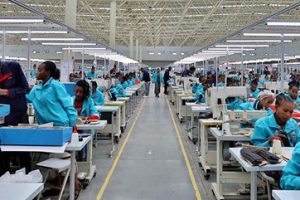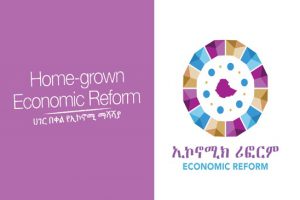
The aim of research outputs is to propose resolutions that would be applied in order to benefit a community though solving the existing constraints or presenting new ideas that can be put into practice. The output of research conducted by Debre Berhan Univesity in collaboration with the Ministry of Innovation and Technology on Integrated Aquaculture Industry seems to benefit the target community.
According to Dr. Engineer Getahun Mekuria, Minister, Ministry of Innovation and Technology, among researches conducted by Ethiopian universities, more than 60 percent of them are supported by the Ministry. Over 300 million Birr budget is allocated from government every year for these research works. Though few of them could be changed to economic benefit, many are stayed as shelf décor.
The Minister related this on the inauguration program of Integrated Aquaculture Industry accomplished jointly with Debre Berhan University in North Shewa Zone, Efratagidim woreda, Yimlo kebele on 19 February 2019. A parameter is set for the universities to apply research works to economic benefits of the community, as to the Minister.
In this case the research works must focus on what the surrounding community possesses and shows the way the community change their own possession to wealth. Innovation means, as to the Minister, is not necessarily inventing new thing, but visualizing the available possessions in a different way. The project conducted by Dr. Gezahegn Degife, a researcher at Debre Berhan University, has a direct influence to improve the livelihood of the community at the vicinity. The project focuses on integrated bio-waste process, aquaculture, poultry and horticulture.
“The project enables our farmers to generate wealth from what they have. For instance, culturing fish, poultry and horticulture in their compound for household consumption and market is a fine model. They ensure their food security with less expense and I am grateful to Dr. Gezahegn and his crew for applying the research to wealth in the farmers’ village,” said the Minister. “The Ministry is keen to support such activities of changing local possession to wealth,” said the Minister, adding, “This research is big not because of the area it covers or capital it worth, but because of its effectiveness in generating wealth with limited input and small area.”
The process is integrated food cycle in which taxonomic worms consume household waste and decompose it to vermi-compost. The compost is used as bio-fertilizer for plants like banana. The chickens consume the worms and the waste of the chickens become food for the fish in turn.
The reports indicate that the chickens, the fish and horticulture get ready for house hold consumption and market purpose within a short period of time, said the Minister. Manuals on the research works are prepared and standards are set to expand the research result to other zones, woredas and individual farmers as well, as of Dr. Engineer Getahun. On the occasion, the Ministry of Innovation and Technology and Debre Berhan University consigned the hard copy of the manuals to the administrator of North Shewa to deliver it to Amhara state on behalf of them.
Dr. Almz Abera, vice president of Debre Berhan University, on her part said that Dr. Gezahegn and his crew deserve great tribute for their tireless effort that required them sacrifice while going to and back between Debre Berhan and Yimlo kebele overcoming the difficult landscape. She is also thankful for Efratagidim woreda administrators for granting the land. As to her, there are millions of job seekers in our country and an average of two million are added to this number each year.
Therefore, these kinds of researches are appreciated for their role in equipping the youth to become job creators instead of job seekers. At the moment, about five members of Hibret Band Yimlo Aquaculture Association have been engaged in the project but in the long run, it will be extended to millions throughout the country, she expressed her ambition.
And also, the fruitfulness of this research is as a spring board for other researches to be applied into practice, she noted. “Ministry of Innovation and Technology is supporting the University in various ways. Ancober Herbal Medicine is vindication for this and I ask their cooperation to continue,” she said. North Shewa Administrator Tefera Wendimagegnehu on his part said that among the missions of the universities, one is conducting community based problem solving researches.
This research work which is carried out by Debre Berhan University and financed by the Ministry of Innovation and Technology is a sample to be extended to the 22 rural woredas and 5 urban administrations of the zone. What makes the research effective is that it can be applied at a small area, he noted.
Dr. Gezahegn Degifie, chief researcher of the project, briefly explained about their activity and success. As of him, the compost produced by vermiculture is the best bio-fertilizer compared to any chemical fertilizer. “Its water holding capacity is very high so that it sustains for a long time even in a scarcity of rain. It enriches the soil easily with necessary minerals for the plants. One indicator for this is the same species of banana plants were planted at the same time on the same ground.
The compost is added to some of the plantations and the others left to grow naturally. The result is amazing that those grew using the compost becomes very big in size and bear fruit in shortly, but the others are short in size and did not bear fruit,” he explained. In addition, this compost is essential to coffee plantation and floriculture.
According to Dr. Gezahegn, it destroys coffee fungi and parasitic nematode that attacks roots of flowers. Afework Abera, head, Efratagidim wereda animals’ resource development, on his part said that the major objective of the project is to create job for the surrounding youths in integrated aquaculture, poultry, and horticulture jointly with Debre Berhan University and Ministry of Innovation and Technology.
The project is intended to be expanded to neighboring weredas. The youth engaged in the project are 5 (4 male and 1 female) for the beginning and all of them are returnees from Arab countries. “At the moment, no one of them is willing to migrate. Instead, they are working with interest; they are working towards improving the livelihood of their family members.” The process is underway to extend the project to six kebeles in the woreda those are fairly rich in water potential, he noted.
Mesfin Tsegaye, Yimlo kebele animals’ breading expert, on his part said that the members of the association have saved up to 40,000 Birr starting from zero balance within about two years. The initial capital was gained from Debre Berhan University with 101 egg lying chickens and 19 quintals of improved chickens’ food. “We the experts deliver home to home agricultural extension service and encourage them to own the chickens and replicate at their home.
As a result, many farmers are applying the council and become beneficiary,” he explained. Mohammed Sheik Ali, chairman of the association, is one of the beneficiaries. On his part, he said that on top of the benefit the members gain at the moment, he is hopeful for the future their income will grow more. He added that others are aspiring to join them recognizing their success though they used to mock against them at the beginning.
Herald February 26/2019
BY BACHA ZWDIE





